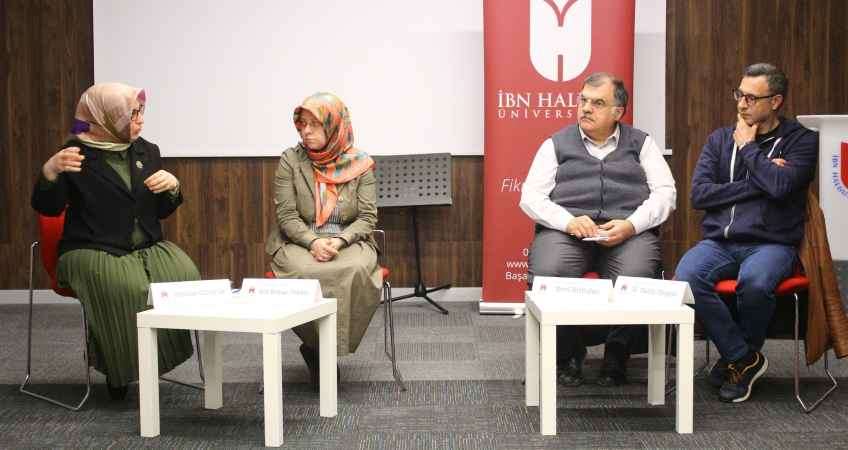


At the Children's Literature panel organized by Ibn Haldun University Literature Club, the course of children's literature in Turkey was discussed. The panel, which was held on Wednesday, March 20 was moderated by İbn Haldun University TÖMER Lecturer and publisher of children's literature, Dr. Melike Günyüz, and attended by Sociologist-Author Erol Erdoğan, Editor-Author H. Salih Zengin and Writer Elif Konar Özkan. In the panel, many issues were discussed, from whether children's literature is educational to how children's books can be inspected, from how to reach children through literature in the digital age to the limits of children's literature.
Answering the question “How to create a good children's literature text?”, H. Salih Zengin stated that the principles of the text will not change whether it is for children or adults, and there will be some differences only in the choice of words and sentences, and stated that the best way to catch attention of the child is the friendship the author establishes with children. Continued his words as follows: “A contemporary children's literature writer has to communicate well with children. The author should nurture himself by communicating with children at school events and autograph sessions.”
In his speech, H. Salih Zengin also mentioned that children's literature has gained a different dimension in the digitalized world. Noting that the work of today's children's writers is more difficult because the time between generations is getting shorter and shorter, Zengin said: “One-third of internet users in the world are children under the age of 18. Understanding and communicating with the new generation has become difficult. Today, children can spend 8 hours a day in front of a screen. They look at their mobile phone 150 times a day. No child keeps information in their memory any longer; they only keep the relevant keywords in mind. They assume that they can reach all the information through search engine with those words when necessary. The author must reach the child with the awareness of all these.”
H. Salih Zengin stated that there has been a significant increase in the sales of children's magazines in Turkey because parents have gained awareness that their children should not spend so much time on the internet and with technological products. Stating that children's books allow parents to communicate with their children, he noted that technological devices such as tablets and televisions are the nanny in the house where no books are read.
The relationship between children's literature and education was also discussed in the panel. Dr. Melike Günyüz stated that the main function of literature is not education and said, “Education is secondary. The primary function of children's literature is to teach children the possibilities of language.” Stating that didactic books cannot achieve their purpose in educating children, Erol Erdoğan said, “In knowledge where literature is not guided, the lore and wisdom part of the work is missing.”
H. Salih Zengin reminded that during the February 28 process, children's publications without a literary aspect emerged due to the fear of "religion is going away" in the religious community. Stating that these publications, which have a style that preaches to children, are useless products that have turned into commercial goods over time, Zengin saying, “Now, the secular segment is experiencing a similar break. For example, we can give examples of Yılmaz Özdil's children's books about Mustafa Kemal Atatürk. These books are an effort to fill the ideological vacuum that the secular people see in their children.” made his assessment.
Elif Konar Özkan, in her speech at the panel, stated that the age group is not an adequate criterion when recommending books to children, and touched upon the following: “Some parents ask for book recommendations by stating their children's ages. I do not find it right to recommend a book without knowing the child, what he has read and liked before. A literary work must first be read because it is loved. When kids see something that appeals to them, they don't turn their backs on it. The child is still a child and human is still a human. A children's literature writer is nourished by living with children in every aspect of life.”
The panel also touched upon the issue of inspecting children's books. Emphasizing the necessity of strengthening the editorial institution and the criticism mechanism in this regard, attention was drawn to the inaccuracy of inspections, which amounted to censorship. Erol Erdoğan stated that a discipline must be established in the academy regarding the criticism of children's literature. Melike Günyüz, on the other hand, stating that although editing is a very serious issue, it is a field that has just come to the agenda and discussed in our country and “Unfortunately, there is no institution in our country that trains children's literature writers and children's literature editors” said.